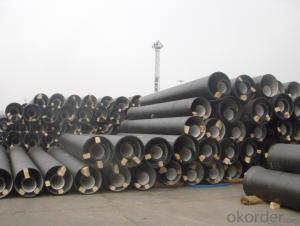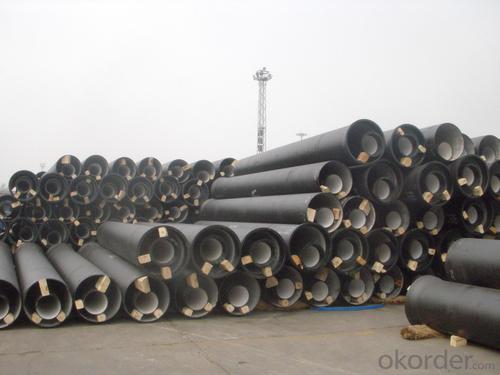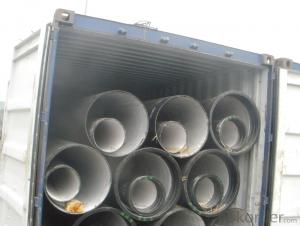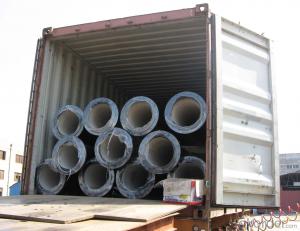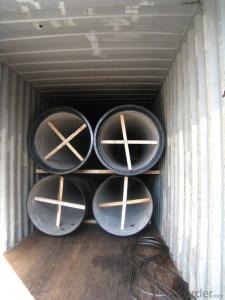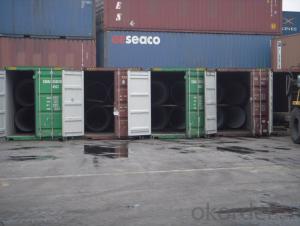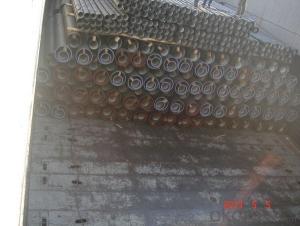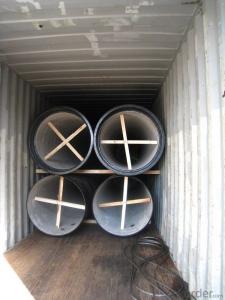DUCTILE IRON PIPE AND PIPE FITTINGS C CLASS DN1200
- Loading Port:
- Tianjin
- Payment Terms:
- TT OR LC
- Min Order Qty:
- 33 pc
- Supply Capability:
- 3000 pc/month
OKorder Service Pledge
OKorder Financial Service
You Might Also Like
· Material : Ductile Cast Iron
· Size Range : DN 80mm to DN 2000mm
· Unit Effective Length : 6m or 5.7m
· Manufacture Standard: ISO 2531:1998/ EN 545:2006/EN 598:2007
· Annual capacity : 200,000 tons
· Coating Exterior: Zinc 130g/m2 according to ISO 8179-1 and bitumen coating 70 microns.
· Cement Interior: Portland Cement/ High Alumina Cement/ Sulphate Resisting Cement Lining according to ISO 4179
· Special requirements on external coating and internal lining can be applied
· We also provide accessories such as SBR/EPDM rubber gaskets, lubricant paste, pipe caps, PE sleeves, etc.
Additional Parts:
Each pipe is strictly inspected according to related standard to ensure permanently high performance.
Easy Installation at site and service free for life
Long Service Lifespan
Quotation will arrive you within 24hours once we get your inquiry.
We guarantee offering you a competitive price.
A copy of original inspection reports of pipes will be offered after shipment.
Photos of loading process will be sent to the customer after shipment effect.
We will follow-up the delivery progress after shipment effect and update to the customer on weekly basis.
- Q: Are ductile iron pipes suitable for power plant applications?
- Yes, ductile iron pipes are suitable for power plant applications. Ductile iron is a type of cast iron that has enhanced strength, durability, and flexibility compared to traditional cast iron pipes. These properties make ductile iron pipes ideal for power plant applications where they are exposed to high pressure, extreme temperatures, and corrosive environments. Power plants often require a reliable and robust piping system to transport various fluids such as water, steam, and chemicals. Ductile iron pipes have high tensile strength and can withstand high pressure, ensuring the safe and efficient flow of these fluids within a power plant. Their ability to handle high-pressure steam makes them particularly suitable for power generation applications. Additionally, ductile iron pipes have excellent resistance to corrosion, which is crucial in power plants where many fluids can be highly corrosive. The internal and external linings of these pipes protect them from corrosion, ensuring a longer service life and reducing maintenance costs. This corrosion resistance also makes them suitable for transporting chemicals and wastewater within a power plant. Another benefit of ductile iron pipes is their ability to withstand extreme temperatures. Power plants often operate at high temperatures, and ductile iron pipes can handle these conditions without compromising their structural integrity. They have a high melting point and can resist thermal expansion and contraction, making them suitable for applications involving hot fluids and steam. Furthermore, ductile iron pipes are cost-effective compared to other materials commonly used in power plants, such as stainless steel or carbon steel. They offer a balance between performance and cost, making them an attractive choice for power plant applications. In conclusion, ductile iron pipes are well-suited for power plant applications due to their strength, durability, flexibility, corrosion resistance, and ability to withstand high pressures and extreme temperatures. Their cost-effectiveness further adds to their suitability for power plant piping systems.
- Q: Are ductile iron pipes resistant to impact damage?
- Yes, ductile iron pipes are highly resistant to impact damage due to their inherent strength and durability.
- Q: Can ductile iron pipes be used for water tunnel crossings?
- Yes, ductile iron pipes can be used for water tunnel crossings. Ductile iron pipes are known for their strength, durability, and resistance to corrosion, making them a suitable choice for various applications, including water tunnel crossings. They are capable of withstanding high pressure, external loads, and ground movements, which are often encountered in tunnel crossings. Additionally, ductile iron pipes have a long service life and require minimal maintenance, making them a cost-effective solution for water tunnel crossings.
- Q: Can ductile iron pipes be used for both water and wastewater applications?
- Yes, ductile iron pipes can be used for both water and wastewater applications. Ductile iron pipes are known for their strength and durability, making them suitable for conveying both water and wastewater. They have excellent corrosion resistance and can withstand high pressures, making them a reliable choice for various applications in the water and wastewater industry.
- Q: Can ductile iron pipes be used for underground storage tanks?
- Ductile iron pipes can indeed be used for underground storage tanks in certain situations. Ductile iron is a strong and durable material that is resistant to corrosion, making it suitable for underground applications. However, there are a few factors to consider before using ductile iron pipes for underground storage tanks. Firstly, it is important to assess the specific requirements and regulations of the project. Different regions and industries may have specific guidelines for the materials used in underground storage tanks. It is crucial to ensure that ductile iron pipes comply with these regulations and meet the necessary standards for underground storage. Secondly, the size and capacity of the storage tank should be considered. Ductile iron pipes are available in a variety of sizes, but they may not be suitable for large-scale storage tanks due to limitations in their dimensions. It is important to consult with engineers or experts to determine the appropriate pipe size and capacity for the specific storage requirements. Lastly, the design and installation of the underground storage tank should be carefully planned. Proper sealing and protection against external factors such as soil movements, water pressure, or other potential hazards should be considered. Adequate measures should be taken to prevent leaks or damage to the pipes, ensuring the safety and longevity of the storage tank. In conclusion, ductile iron pipes can be used for underground storage tanks, but it is essential to consider the specific requirements, regulations, sizing limitations, and proper design and installation. Consulting with professionals in the field and adhering to industry standards will ensure the successful use of ductile iron pipes for underground storage tanks.
- Q: If the ductile iron pipe is broken, can we use rush repair?
- In this way, manpower, material resources and financial resources can be saved, time can be saved, and unnecessary troubles to the citizens' water supply can also be reduced.
- Q: What is the minimum operating temperature for ductile iron pipes?
- The minimum operating temperature for ductile iron pipes is typically -40 degrees Celsius. Ductile iron has excellent strength and ductility even in cold temperatures, making it suitable for a wide range of applications, including water and wastewater systems. However, it is important to note that the specific minimum operating temperature can vary depending on factors such as the specific grade of ductile iron used and the application requirements. It is always recommended to consult the manufacturer's specifications and guidelines to ensure proper usage and performance of ductile iron pipes in cold temperatures.
- Q: How does ductile iron pipe perform in areas with high soil compaction?
- Ductile iron pipe performs well in areas with high soil compaction due to its strong and durable characteristics. Its flexible nature allows it to withstand the pressure exerted by compacted soil, preventing deformation or damage. Additionally, the material's high tensile strength and resistance to cracking make it an ideal choice for areas where soil compaction is a concern.
- Q: Ductile iron and gray iron is what are the advantages and disadvantages of it
- Comparison of nodular cast iron and cast steelThe strength of nodular cast iron is comparable to that of cast steel. Ductile iron has higher yield strength, the lowest yield strength is 40K, while the yield strength of cast steel is only 36k. In most municipal applications, such as water, brine, steam, ductile iron has more corrosion resistance and oxidation resistance than cast steel. Because of the spheroidal graphite microstructure of nodular cast iron, nodular cast iron is superior to cast steel in reducing vibration ability, so it is more beneficial to reduce stress. An important reason for choosing ductile iron is that ductile iron costs less than cast steel. The low cost of ductile iron makes this material more popular, more efficient and less costly for ductile iron.
- Q: Are ductile iron pipes suitable for water distribution networks?
- Yes, ductile iron pipes are highly suitable for water distribution networks. They possess excellent strength, durability, and corrosion resistance, making them ideal for carrying and delivering water over long distances. Additionally, their flexibility allows for easy installation and adaptability to various terrains, ensuring reliable and efficient water distribution.
Send your message to us
DUCTILE IRON PIPE AND PIPE FITTINGS C CLASS DN1200
- Loading Port:
- Tianjin
- Payment Terms:
- TT OR LC
- Min Order Qty:
- 33 pc
- Supply Capability:
- 3000 pc/month
OKorder Service Pledge
OKorder Financial Service
Similar products
Hot products
Hot Searches
Related keywords
